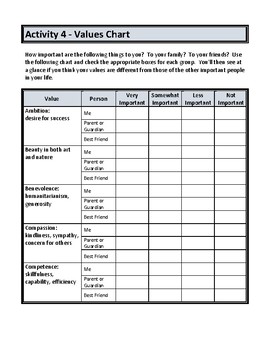Understanding The Good Life: Defining Your Values And Goals

Table of Contents
Identifying Your Core Values
Understanding your core values is the cornerstone of a meaningful life. These deeply held beliefs and principles guide your decisions, shape your actions, and ultimately determine your level of satisfaction. Without a clear understanding of your values, your goals might be misaligned, leading to feelings of emptiness or unfulfillment, even if you achieve external successes. Defining your values is the first crucial step toward creating a life that truly resonates with you.
Values Clarification Exercises
Several exercises can help you uncover your core values. These exercises encourage self-reflection and can reveal what truly matters to you.
-
List 5-10 things you're most grateful for. Analyze what those things represent in terms of values. Are you grateful for your strong family bonds (implying the value of family)? Or perhaps for the freedom to pursue your passions (highlighting the value of independence)?
-
Imagine your ideal future self. What characteristics define them? Are they compassionate, successful, creative, adventurous? These attributes reveal your underlying values.
-
Reflect on past experiences. What moments brought you the most joy and fulfillment? What values were at play? Perhaps a volunteering experience showed you the importance of contribution, or a challenging hike revealed your appreciation for nature and physical well-being.
Common values include family, creativity, freedom, health, learning, contribution, security, and spirituality. Remember, your values are unique to you.
Prioritizing Your Values
While many values may be important, not all are created equal. Prioritizing your values allows you to focus your energy and resources on what truly matters most. This is essential for navigating inevitable conflicts that might arise. For example, a desire for financial security (a value) might conflict with a desire for more time with family (another value).
-
Consider your current life situation. What challenges are you facing? What resources do you have?
-
Think about which values align with your long-term aspirations. What kind of life do you envision for yourself in five, ten, or twenty years?
-
Be realistic about what you can achieve. It's important to set achievable goals based on your prioritized values, considering your time, energy, and resources.
Setting Meaningful Goals
Once you've identified and prioritized your values, you can start setting meaningful goals that align with them. These goals will provide a roadmap for achieving a life that reflects your core beliefs and principles. Remember, goals should be more than just aspirations; they should be tangible steps toward living a life in accordance with your values.
SMART Goal Setting
To ensure your goals are effective, use the SMART criteria:
- Specific: Clearly define what you want to achieve.
- Measurable: Establish ways to track your progress.
- Achievable: Set realistic goals you can accomplish.
- Relevant: Ensure your goals align with your values.
- Time-bound: Set deadlines to create a sense of urgency.
For example, if health and well-being are high on your value list, a SMART goal might be: "Spend 30 minutes per day practicing yoga to improve my physical and mental health by the end of the year."
- Family: Plan a family vacation by December 2024.
- Creativity: Write 500 words per week on a creative project.
- Financial Security: Save $1000 per month for a down payment.
Breaking Down Large Goals
Ambitious goals can feel overwhelming. Breaking them down into smaller, manageable steps makes the process less daunting and provides a sense of accomplishment along the way.
- Use a project management tool.
- Create a timeline with milestones.
- Set deadlines for smaller tasks.
Living a Purposeful Life
Connecting your values and goals leads to a purposeful life—a life where your actions are aligned with what truly matters to you. This sense of purpose contributes significantly to overall happiness and well-being.
The Role of Contribution
Contributing to something larger than yourself adds another layer of meaning and fulfillment to life. This could involve volunteering for a cause you care about, mentoring others, or supporting a community initiative.
- Volunteer for a local charity.
- Mentor someone.
- Support a cause you believe in.
Continuous Self-Reflection
Remember, your values and goals may evolve over time. Continuous self-reflection helps ensure they remain aligned with your evolving self.
- Regularly review your values and goals.
- Journal your progress and challenges.
- Seek feedback from trusted sources.
Conclusion
Understanding your core values, setting meaningful goals aligned with those values, and actively contributing to something larger than yourself are all key components of achieving the good life. This journey of self-discovery is ongoing, requiring continuous self-reflection and adaptation. By embracing this process, you can create a life that truly reflects your aspirations and brings you lasting fulfillment. Begin your journey towards understanding the good life by taking our free values clarification quiz today! Start living a life that reflects your true values and aspirations.

Featured Posts
-
 Insacogs Report On Ba 1 And Lf 7 Covid 19 Variants In India Assessing The Risk
May 31, 2025
Insacogs Report On Ba 1 And Lf 7 Covid 19 Variants In India Assessing The Risk
May 31, 2025 -
 Thursday March 27 2025 5 Key Things You Need To Know
May 31, 2025
Thursday March 27 2025 5 Key Things You Need To Know
May 31, 2025 -
 The Impact Of Reduced Chinese Enrollment On American Higher Education
May 31, 2025
The Impact Of Reduced Chinese Enrollment On American Higher Education
May 31, 2025 -
 The Impact Of Dangerous Climate Whiplash On Cities A Comprehensive Report
May 31, 2025
The Impact Of Dangerous Climate Whiplash On Cities A Comprehensive Report
May 31, 2025 -
 Severe Storms Possible Across Carolinas Tracking Active Vs Expired Weather Alerts
May 31, 2025
Severe Storms Possible Across Carolinas Tracking Active Vs Expired Weather Alerts
May 31, 2025
